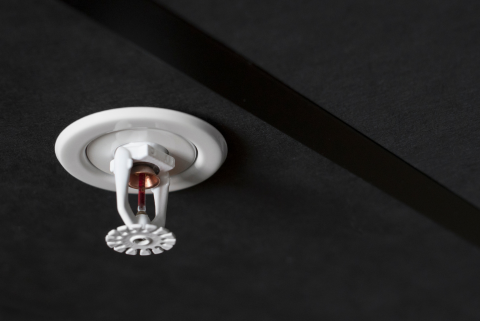
Fire Sprinkler System Tips
As cold weather approaches, sprinkler systems are at a heightened risk for freeze-ups and failures. A frozen or leaking system can result in major property damage, long business interruptions, and system failure during a fire emergency.
Follow the steps below to ensure your system stays reliable this winter:
Essential Actions for Property Managers
- Maintain Heat in Vulnerable Areas:
- Keep all rooms with sprinkler piping (wet or dry) at 40°F or above.
- Pay special attention to attics, loading docks, stairwells, vestibules, and exterior walls.
- Inspect Regularly:
- Walk through cold-exposed areas daily during freezing conditions.
- Look for drafts, open doors, or cold spots near sprinklers, skylights, and windows.
- Check gauges and valve rooms for proper pressure and temperature.
- Inspect sprinkler heads for obstructions (e.g. storage too close, dust/dirt/paint accumulation)
- Visually scan lines for signs of corrosion as they can indicate small leaks and cracks.
- Drain Properly:
- Ensure auxiliary drains on dry systems are emptied as needed to prevent condensation and ice build-up. Keeping a log of each drain can help you determine the frequency of draining as some may be more prone than others to build up faster.
- Verify with a level that the proper slope on dry systems is efficient, so water does not collect.
- Inspect water once drained for signs of internal corrosion (e.g. particles, rust color).
- Secure the Valve/Pump Room:
- Confirm the room is heated, labeled, and free of storage clutter.
- Maintain 36” clearance in front and 18” on each side of sprinkler controls/pumps.
- Train a Competent Person On-Site/every shift:
- Assign someone who understands shutoff valves and emergency protocols and ensure staff know when to shut down due to failure to prevent damages and not actual emergency fighting a fire.
- Ensure staff know how to contact your contractor 24/7 in case of emergency.
- Plan Ahead:
- Monitor weather forecasts and prepare before cold snaps or storms.
- Review your contractor’s inspection schedule before the season.
Common Causes of Freeze Failures
- Open exterior doors or drafts from loading docks and smoking areas.
- Poorly insulated walls and ceilings.
- Unmonitored cold rooms, mezzanines, or vacant tenant spaces.
- Lack of regular draining on dry systems.
Quick Checklist
- Heat confirmed in all sprinkler areas.
- Draft protection and insulation verified.
- Auxiliary drains are checked, accessible, tracked, and monitored.
- Daily walk-throughs planned for cold weather.
- Emergency contacts and shutdown procedures posted.
Sprinkler systems save lives and property—but only if they work when needed. Preventing freeze-ups and leaks is one of the most important responsibilities of building management.
Temperature and Leak Detection from Farm Bureau Insurance
Eligible clients of Farm Bureau Insurance qualify for a no cost temperature/humidity and leak detection services. Reach out to our agency to see if you qualify for more details.


